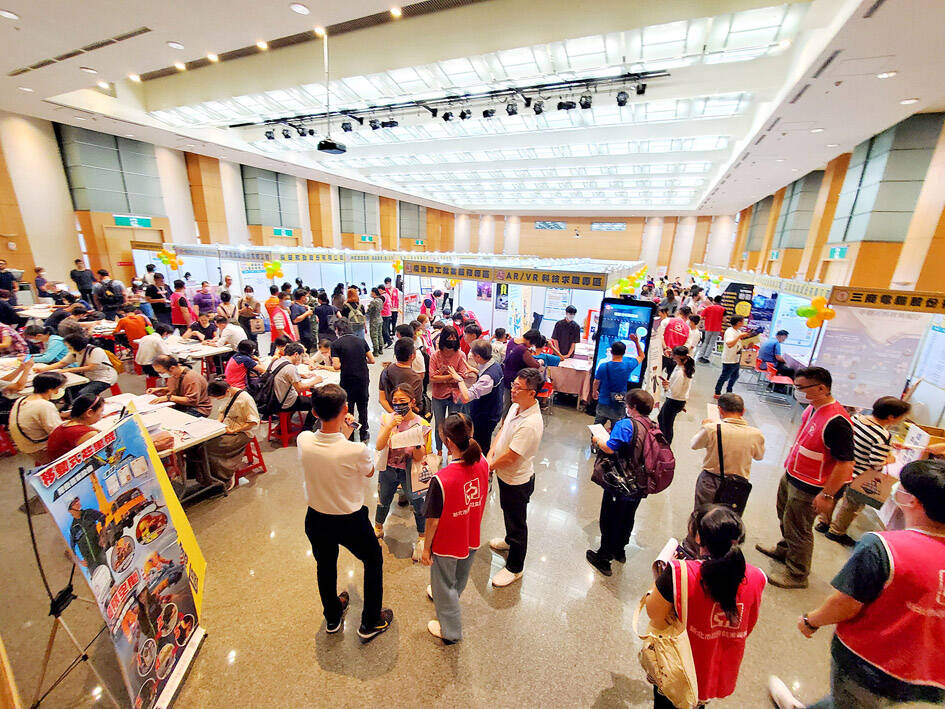The nation’s unemployment rate slid 0.02 percentage points to 3.31 percent in January, the lowest for the same period in 24 years, as fewer jobs were lost owing to business downsizing or closures, the Directorate-General of Budget, Accounting and Statistics (DGBAS) said yesterday.
The reading after seasonal adjustments held steady at 3.39 percent and likely rose slightly last month, as companies end temporary positions and discontented workers tend to switch jobs after the Lunar New Year holiday, Census Department Deputy Director Chen Hui-hsin (陳惠欣) said, adding that the unemployment rate usually sees a seasonal pickup of 0.03 to 0.08 percentage points in February.
The effect might be delayed this year due to the relative late timing of the holiday, Chen said.

Photo: CNA
The DGBAS for the first time reported on the unemployment rate for the past four weeks, in line with the International Labor Organization’s requirement.
At 3.35 percent, it marked a decline of 0.03 percentage points from one month earlier, she said.
January’s jobless population stood at 397,000, a decrease of 2,000 from the level in December, as the number of people who lost jobs due to business downsizing and closures shrank by 5,000, more than muting an increase of 2,000 in the number of people who quit, the agency said.
Overall, Taiwan’s job market has returned to pre-COVID-19 levels, judging by the cumulative decline of 51,000 in the number of people who lost jobs to business downsizing and closures since July 2022, when Taiwan ended major gathering restrictions, Chen said.
University graduates had the highest unemployment rate at 4.51 percent, followed by high-school graduates at 3.1 percent, and people with graduate degrees at 2.52 percent, the agency said.
People with junior-high school or lower education had the lowest jobless rate of 2.08 percent, it found.
By demographic breakdown, people aged 20 to 24 had the highest unemployment rate at 11.3 percent, followed by those aged 15 to 19 at 8.24 percent, and those aged 25 to 29 at 5.81 percent, the agency said.
The jobless rate for older people aged 45 to 64 was the lowest at 2.08 percent, it said.
The unemployed period stretched longer to 20.9 weeks on average, with first-time jobseekers reporting greater difficulty landing positions at 24.3 weeks, the DGBAS said.

RECYCLE: Taiwan would aid manufacturers in refining rare earths from discarded appliances, which would fit the nation’s circular economy goals, minister Kung said Taiwan would work with the US and Japan on a proposed cooperation initiative in response to Beijing’s newly announced rare earth export curbs, Minister of Economic Affairs Kung Ming-hsin (龔明鑫) said yesterday. China last week announced new restrictions requiring companies to obtain export licenses if their products contain more than 0.1 percent of Chinese-origin rare earths by value. US Secretary of the Treasury Scott Bessent on Wednesday responded by saying that Beijing was “unreliable” in its rare earths exports, adding that the US would “neither be commanded, nor controlled” by China, several media outlets reported. Japanese Minister of Finance Katsunobu Kato yesterday also

Taiwan’s rapidly aging population is fueling a sharp increase in homes occupied solely by elderly people, a trend that is reshaping the nation’s housing market and social fabric, real-estate brokers said yesterday. About 850,000 residences were occupied by elderly people in the first quarter, including 655,000 that housed only one resident, the Ministry of the Interior said. The figures have nearly doubled from a decade earlier, Great Home Realty Co (大家房屋) said, as people aged 65 and older now make up 20.8 percent of the population. “The so-called silver tsunami represents more than just a demographic shift — it could fundamentally redefine the

China Airlines Ltd (CAL, 中華航空) said it expects peak season effects in the fourth quarter to continue to boost demand for passenger flights and cargo services, after reporting its second-highest-ever September sales on Monday. The carrier said it posted NT$15.88 billion (US$517 million) in consolidated sales last month, trailing only September last year’s NT$16.01 billion. Last month, CAL generated NT$8.77 billion from its passenger flights and NT$5.37 billion from cargo services, it said. In the first nine months of this year, the carrier posted NT$154.93 billion in cumulative sales, up 2.62 percent from a year earlier, marking the second-highest level for the January-September

‘DRAMATIC AND POSITIVE’: AI growth would be better than it previously forecast and would stay robust even if the Chinese market became inaccessible for customers, it said Taiwan Semiconductor Manufacturing Co (TSMC, 台積電) yesterday raised its full-year revenue growth outlook after posting record profit for last quarter, despite growing market concern about an artificial intelligence (AI) bubble. The company said it expects revenue to expand about 35 percent year-on-year, driven mainly by faster-than-expected demand for leading-edge chips for AI applications. The world’s biggest contract chipmaker in July projected that revenue this year would expand about 30 percent in US dollar terms. The company also slightly hiked its capital expenditure for this year to US$40 billion to US$42 billion, compared with US$38 billion to US$42 billion it set previously. “AI demand actually